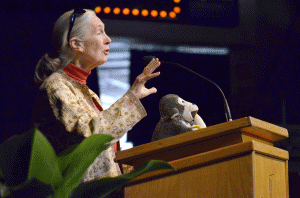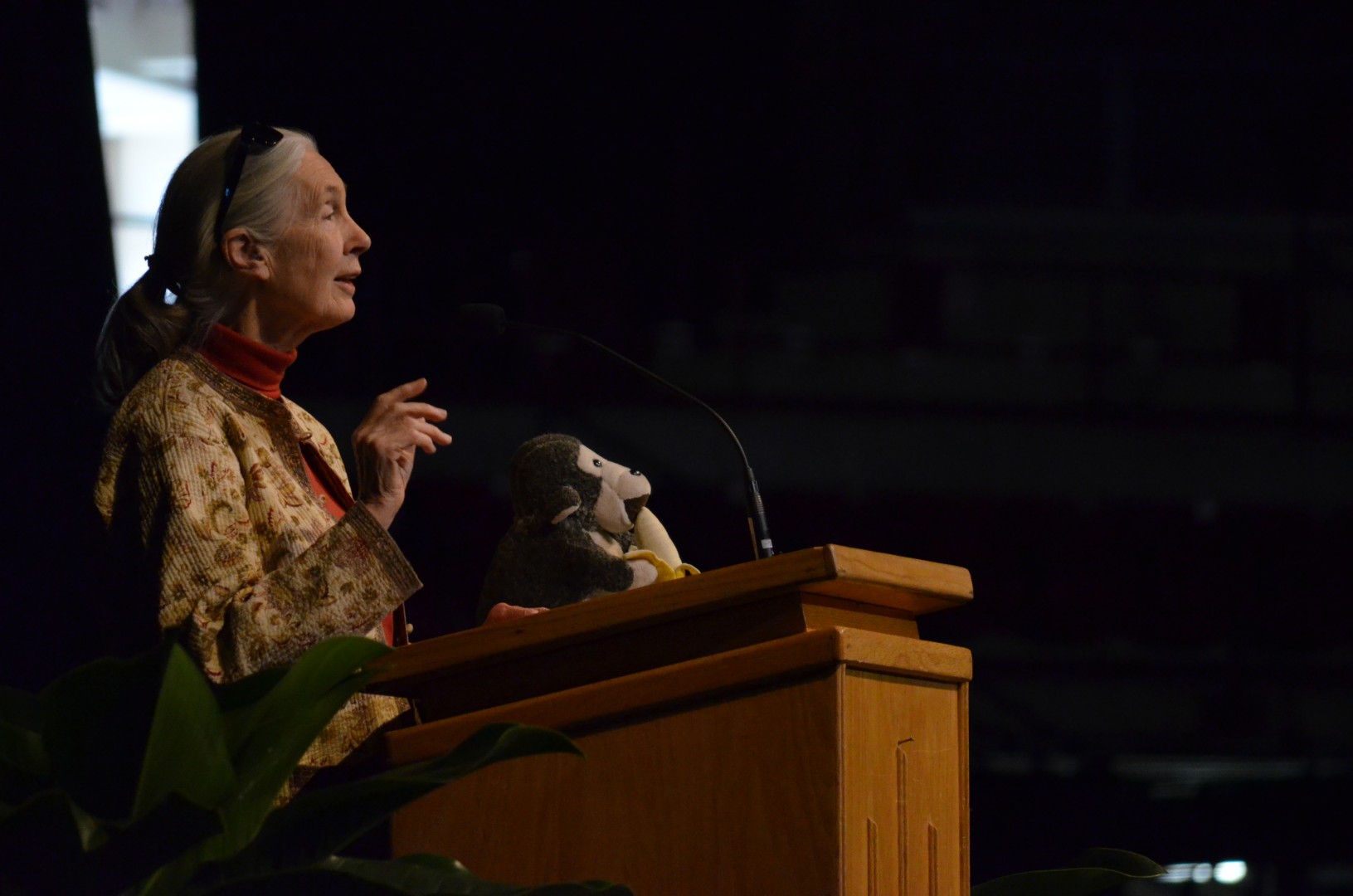
Jane Goodall spoke to a crowd of approximately 3,000 community members, Colorado teachers and students, and members of the DU community in Magness Arena last Saturday morning as a keynote speaker for the 2013 Fifth Annual Share Fair technology and education fair.
The Share Fair was sponsored by the Morgridge Family Foundation, and was a day-long series of teacher workshops designed to promote the sharing of ideas among educators concerning the use of technology in the classroom.
Goodall, who is known for her work with chimpanzees and a scientific career lasting more than five decades, spoke about her personal story, the worrisome state of our planet and the importance of education in addressing those worries in her keynote address, entitled “Making a Difference: Conservation through Education.”
Goodall said she was always interested in the world around her, and told stories of the adventures she had in nature as a child. She said she loved Dr. Doolittle when she was young, and especially enjoyed Tarzan.
“…and what did [Tarzan] do?” she asked. “He married the wrong Jane.”
Goodall said she felt lucky to have grown up with very little money because she could relate to underprivileged youth around the world as a result. She credited her mother for the success she has been able to achieve in her career, saying that without her mother she probably never would have left her native United Kingdom to research chimpanzees in Africa.
“My mother always told me that if you really want something, you have to work really hard and never give up,” said Goodall.
After she made her way to Africa on a limited budget, Goodall worked with chimpanzees and observed them using objects as tools. According to Goodall, scientists thought only humans were capable of those types of actions up until that point. Her discovery led to funding from National Geographic, which helped launch Goodall’s scientific career.
After several years of research, Goodall returned to the UK to go to school at Cambridge University. At Cambridge, she was told the animals she worked with did not have individual personalities and should therefore be given individual numbers instead of names. She disagreed with that thinking, and made it a major point of her outreach after her education.
“Once we understand we are not the only creatures with personalities, minds, and feelings, then it gives us pause to think about the way we use and abuse so many animals throughout the world,” she said. “I had a teacher when I was young who taught me that animals absolutely have personalities, minds and feelings, and that was my dog Rusty.”
In her hour-long presentation, Goodall also addressed the abuse of industrial agricultural practices in relation to animals, the advancement of technology and the importance of balancing conservation in developing areas with care and infrastructure for the local people. She also called for increased support for conservation programs.
Additionally, she addressed the issue of global warming, saying that climate change is apparent all around us.
“It’s this materialistic society in which so many people live that has led to the destruction of the planet,” she said. “This crazy idea that it’s possible to have unlimited economic development on a planet with finite natural resources—it doesn’t make sense.”
However, Goodell stressed the importance of looking for the possibilities of the future instead of focusing on the destruction of the past.
“Considering what we’ve done to the planet, it’s not surprising that young people are feeling hopeless about the future,” she said. “But I have reasons for hope. If you have no hope, you slip into apathy.”
Goodall emphasized hope and passion as essential for the next generation. She praised the educators in the room for fostering young minds, saying that young people need to learn about issues such as environmental degradation and cruelty to animals in order to do anything about them. Similarly, she said that students must also be shown that there are solutions to these challenging problems.
“Teachers have the care of the young people. It’s the young people’s world, we adults have more or less destroyed large parts of the world, and it’s high time that young people are given hope and inspiration so that they grow up to be better caretakers than we’ve been. Otherwise, it’s all going to be too late,” she said.
When asked if she had any advice for DU students, Goodall again emphasized passion.
“A lot of [young people] aren’t quite sure what direction to take. Don’t hurry it. Wait until something arouses your passion—something you really want to do—and don’t make your decision based on how much your pay packet will be,” she said. “Too many people are living for money. We need money to live but we shouldn’t live for money.”
Finally, Goodall said that each person can have a positive impact on the world.
“Every single day every single one of us makes a difference,” she said. “We make an impact on the planet, and if we take a few minutes to think about the consequences of the little choices we make—what we buy, what we eat, what we wear, how we get from A to B, how we interact with animals and the environment—we will slowly make better choices, and that will move us toward a better world for all living things.”
A “STEMosphere” followed Goodall’s address. It featured interactive and educational technology exhibits designed to help educators and entrepreneurs from across Colorado network to discuss Science, Technology, Engineering and Math (STEM) education.
Numerous educationally-based organizations contributed support and presentations to the Share Fair event, including: Apple Education, the Denver Museum of Nature and Science, the Jane Goodall Institute Roots & Shoots program, and the Denver Art Museum. Educators from local Denver schools also presented their experiences with successful use of technology in their classrooms. Representatives from public, private, and charter schools were all present, as were those from all education levels, from elementary to higher education.











